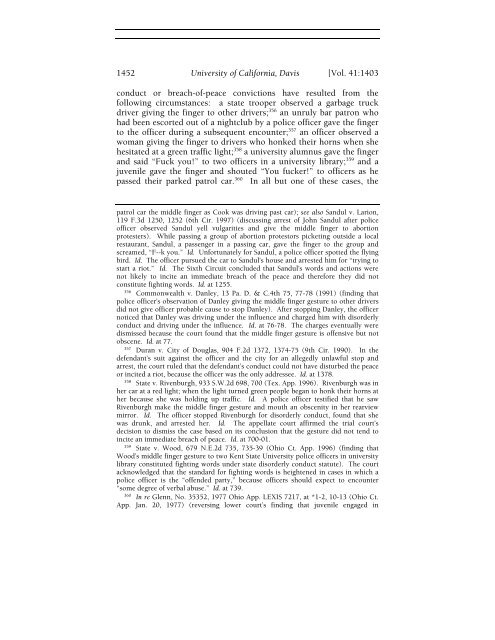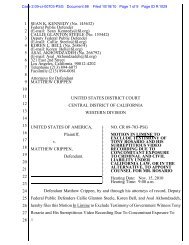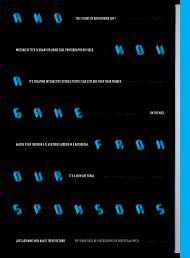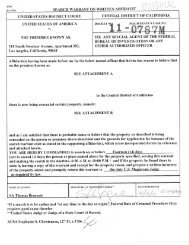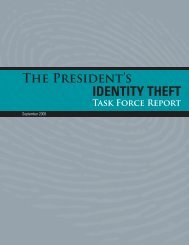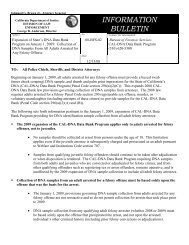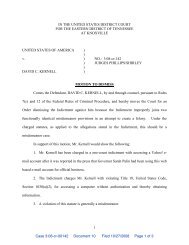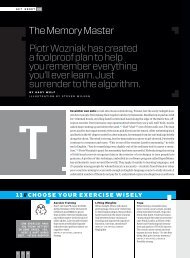Digitus Impudicus: The Middle Finger and the Law - Wired
Digitus Impudicus: The Middle Finger and the Law - Wired
Digitus Impudicus: The Middle Finger and the Law - Wired
Create successful ePaper yourself
Turn your PDF publications into a flip-book with our unique Google optimized e-Paper software.
1452 University of California, Davis [Vol. 41:1403<br />
conduct or breach-of-peace convictions have resulted from <strong>the</strong><br />
following circumstances: a state trooper observed a garbage truck<br />
driver giving <strong>the</strong> finger to o<strong>the</strong>r drivers; 356 an unruly bar patron who<br />
had been escorted out of a nightclub by a police officer gave <strong>the</strong> finger<br />
to <strong>the</strong> officer during a subsequent encounter; 357 an officer observed a<br />
woman giving <strong>the</strong> finger to drivers who honked <strong>the</strong>ir horns when she<br />
hesitated at a green traffic light; 358 a university alumnus gave <strong>the</strong> finger<br />
<strong>and</strong> said “Fuck you!” to two officers in a university library; 359 <strong>and</strong> a<br />
juvenile gave <strong>the</strong> finger <strong>and</strong> shouted “You fucker!” to officers as he<br />
passed <strong>the</strong>ir parked patrol car. 360 In all but one of <strong>the</strong>se cases, <strong>the</strong><br />
patrol car <strong>the</strong> middle finger as Cook was driving past car); see also S<strong>and</strong>ul v. Larion,<br />
119 F.3d 1250, 1252 (6th Cir. 1997) (discussing arrest of John S<strong>and</strong>ul after police<br />
officer observed S<strong>and</strong>ul yell vulgarities <strong>and</strong> give <strong>the</strong> middle finger to abortion<br />
protesters). While passing a group of abortion protestors picketing outside a local<br />
restaurant, S<strong>and</strong>ul, a passenger in a passing car, gave <strong>the</strong> finger to <strong>the</strong> group <strong>and</strong><br />
screamed, “F--k you.” Id. Unfortunately for S<strong>and</strong>ul, a police officer spotted <strong>the</strong> flying<br />
bird. Id. <strong>The</strong> officer pursued <strong>the</strong> car to S<strong>and</strong>ul’s house <strong>and</strong> arrested him for “trying to<br />
start a riot.” Id. <strong>The</strong> Sixth Circuit concluded that S<strong>and</strong>ul’s words <strong>and</strong> actions were<br />
not likely to incite an immediate breach of <strong>the</strong> peace <strong>and</strong> <strong>the</strong>refore <strong>the</strong>y did not<br />
constitute fighting words. Id. at 1255.<br />
356 Commonwealth v. Danley, 13 Pa. D. & C.4th 75, 77-78 (1991) (finding that<br />
police officer’s observation of Danley giving <strong>the</strong> middle finger gesture to o<strong>the</strong>r drivers<br />
did not give officer probable cause to stop Danley). After stopping Danley, <strong>the</strong> officer<br />
noticed that Danley was driving under <strong>the</strong> influence <strong>and</strong> charged him with disorderly<br />
conduct <strong>and</strong> driving under <strong>the</strong> influence. Id. at 76-78. <strong>The</strong> charges eventually were<br />
dismissed because <strong>the</strong> court found that <strong>the</strong> middle finger gesture is offensive but not<br />
obscene. Id. at 77.<br />
357 Duran v. City of Douglas, 904 F.2d 1372, 1374-75 (9th Cir. 1990). In <strong>the</strong><br />
defendant’s suit against <strong>the</strong> officer <strong>and</strong> <strong>the</strong> city for an allegedly unlawful stop <strong>and</strong><br />
arrest, <strong>the</strong> court ruled that <strong>the</strong> defendant’s conduct could not have disturbed <strong>the</strong> peace<br />
or incited a riot, because <strong>the</strong> officer was <strong>the</strong> only addressee. Id. at 1378.<br />
358 State v. Rivenburgh, 933 S.W.2d 698, 700 (Tex. App. 1996). Rivenburgh was in<br />
her car at a red light; when <strong>the</strong> light turned green people began to honk <strong>the</strong>ir horns at<br />
her because she was holding up traffic. Id. A police officer testified that he saw<br />
Rivenburgh make <strong>the</strong> middle finger gesture <strong>and</strong> mouth an obscenity in her rearview<br />
mirror. Id. <strong>The</strong> officer stopped Rivenburgh for disorderly conduct, found that she<br />
was drunk, <strong>and</strong> arrested her. Id. <strong>The</strong> appellate court affirmed <strong>the</strong> trial court’s<br />
decision to dismiss <strong>the</strong> case based on its conclusion that <strong>the</strong> gesture did not tend to<br />
incite an immediate breach of peace. Id. at 700-01.<br />
359 State v. Wood, 679 N.E.2d 735, 735-39 (Ohio Ct. App. 1996) (finding that<br />
Wood’s middle finger gesture to two Kent State University police officers in university<br />
library constituted fighting words under state disorderly conduct statute). <strong>The</strong> court<br />
acknowledged that <strong>the</strong> st<strong>and</strong>ard for fighting words is heightened in cases in which a<br />
police officer is <strong>the</strong> “offended party,” because officers should expect to encounter<br />
“some degree of verbal abuse.” Id. at 739.<br />
360 In re Glenn, No. 35352, 1977 Ohio App. LEXIS 7217, at *1-2, 10-13 (Ohio Ct.<br />
App. Jan. 20, 1977) (reversing lower court’s finding that juvenile engaged in


